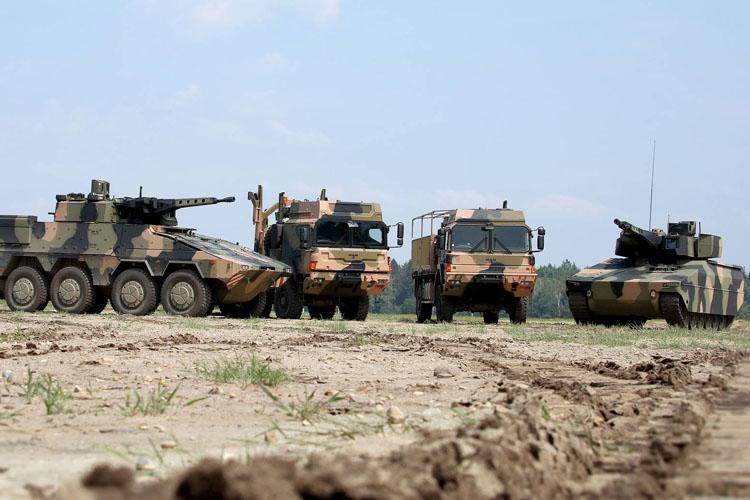
Much of the argument for building warships and submarines in Australia ultimately rests on the rather dubious logic that we’re on an island surrounded by water. But Australia is also surrounded by air, yet nobody is suggesting that we need to build fighter planes and other military aircraft here. And Australia also is full of a lot of sand and dirt, but nobody until recently has suggested that we should be building tanks and armoured vehicles here.
Because we don’t feel the need to design or build aircraft here, the Royal Australian Air Force is in the happy position of being probably the closest thing to a fifth-generation air force in the region and possibly the world. However, because we do feel the need to build ships and submarines here, our navy isn’t going to get a new frigate until the late 2020s or a new submarine until the early to mid-2030s (noting that scheduling details for those projects are more than a little hazy).
The Australian Army’s vehicle projects have fallen somewhere in between, and essentially chart the trajectory of recent defence industry policy. The Department of Defence used to buy vehicles off production lines overseas (ASLAV and Abrams tanks), except when a local company had made something good in a particular niche (the Bushmaster*).
That pattern has continued with Defence’s current truck projects, whose neat banner heading of Project Overlander (LAND 121) hides a reality of a huge complex of interrelated project phases. While one might think, ‘It’s just trucks, so how hard can it be?’, LAND 121 has had one of the most convoluted histories of recent Defence projects, as is well documented by the Australian National Audit Office. It’s been a tortuous journey, with false starts and missteps as Defence sought to balance its aspirations for vehicle numbers, performance and protection against its budget.
Finally, after many twists and turns, in December 2011 the previous government approved the acquisition of over 2,000 Mercedes-Benz G-Wagens at a cost of around $1 billion to replace the army’s ageing Land Rover fleet. Then in July 2013 it approved a further $3.4 billion for around 2,500 Rheinmetall MAN medium and large trucks to replace the army’s very old Mack and Unimog trucks. Both project phases acquired existing vehicles off existing European production lines. Australian industry, however, was responsible for building the thousands of specialised trailers and modules that would ‘Australianise’ the capability.
Since those government approvals, things have gone well. According to the ANAO’s latest major projects report, the G-Wagens were delivered on budget and achieved final operating capability only a few months behind schedule.† The bigger trucks are still being delivered but are on budget and predicted to achieve both initial and final operating capability ahead of schedule. It is a salutary lesson about the value of adhering to basic principles of competitive advantage and buying off-the-shelf equipment when possible.
Since those decisions, we’ve seen a complete remake of defence industry policy under the current government (see the 2016 policy statement and 2018 capability plan). The new strategy strongly favours local builds and has resulted in the $5 billion first portion of LAND 400 for Rheinmetall’s Boxer combat reconnaissance vehicles (CRVs) being assembled on a specially established Australian production line, despite the existence already of three European production lines.
It’s not clear what premium Defence is having to pay for assembling around 186 CRVs in Australia (an initial 25 are being bought from an established production line to get at least some capability into service soon, which does seem to reinforce the arguments for buying off the shelf), or what impact that’s having on the capability outcome or its broader investment program. But it does appear that Defence is paying more than it budgeted for to get fewer vehicles than it planned on.
Plus, the decision has created a future valley-of-death problem for the CRV workforce when the small production run ends. Enter, stage left, the next phase of LAND 400: infantry fighting vehicles with a price tag of $10–15 billion all up. But there may not be much point in auditioning for that role if you’re not Rheinmetall …
So it’s a relief to see that the current defence industry policy didn’t result in the latest (and last) phase of Overlander having to establish a local production line for the final 1,000 medium and heavy trucks. That would inevitably have introduced more cost and consequently delivered less capability for the same investment. Defence Industry Minister Christopher Pyne announced last week that the additional vehicles would be made on an Austrian production line. Whether the government was swayed in this case by data that quantified the premium and consequent opportunity costs is not clear. Nevertheless, it appears there’s still some room for common sense in its application of defence industry policy.
However, it does make one wonder what the original decisions to purchase the G-Wagens and medium and heavy vehicles from factories overseas would look like if they were made today. Given the recent decision to assemble 186 CRVs here, the temptation to announce the assembly of 4,500 vehicles locally would be hard to resist, particularly in the face of state governments clamouring for a piece of Defence’s capital budget. But would that have given the army the outcome it needed on time and on budget?
* My colleague Brendan Nicholson is writing an account of the Bushmaster story as part of ASPI’s series of case studies in defence projects.
† Why does the ANAO’s major projects report still cover a project that has delivered its full scope on time and on budget when it doesn’t cover the future submarine and future frigate projects?